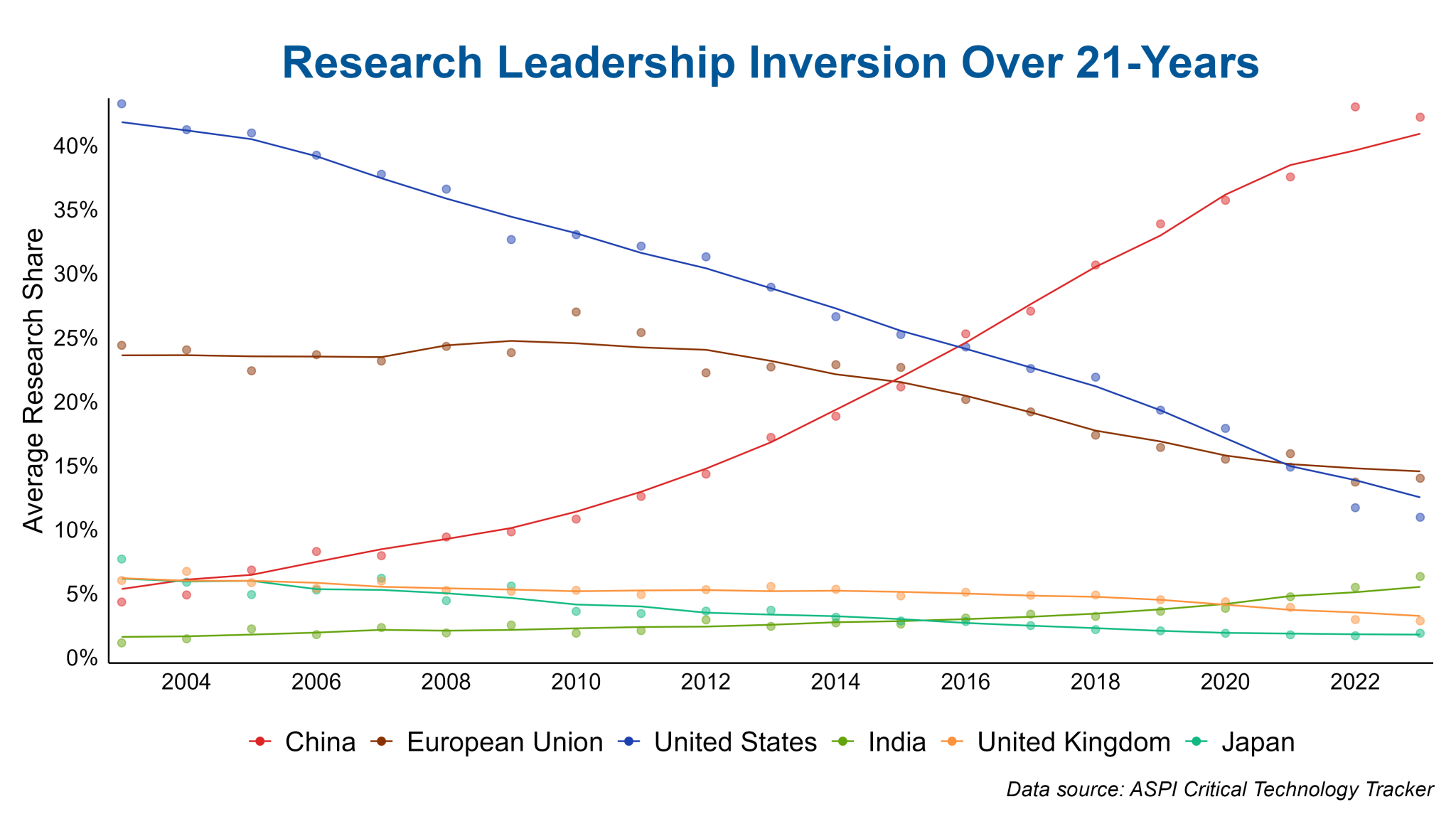
The findings, detailed in a new report, highlight a dramatic shift in research leadership towards large economies in the Indo-Pacific, spearheaded by China’s advancements.
China has made notable gains in areas such as quantum sensors, high-performance computing, gravitational sensors, space launch, and advanced integrated circuit design and fabrication (semiconductor chip making).
Meanwhile, the US maintains its lead in quantum computing, vaccines, nuclear medicine, radiotherapy, small satellites, atomic clocks, genetic engineering, and natural language processing.
From 2003 to 2007, China led in just three out of 64 technologies. Fast forward to the past five years (2019 to 2023), and China is now the leading nation in 57 of these technologies, an increase from 52 last year. In stark contrast, the US led in 60 technologies from 2003 to 2007 but now leads in only seven.
The importance of critical technologies has been underscored by US National Security Adviser Jake Sullivan’s visit to Beijing this week—the first by a US NSA since 2016.
Concurrently, the third Sydney Dialogue has brought together numerous countries in Australia to discuss technology, security, cyber issues, and global strategic competition.
India is also making significant strides and becoming a key player in global research innovation. India now ranks in the top five countries for 45 of 64 technologies (up from 37 last year) and has surpassed the US in two new technologies: biological manufacturing and distributed ledgers.
The latest Tech Tracker results cover 64 critical technologies across fields including artificial intelligence, defence, space, energy, environment, biotechnology, robotics, cyber, computing, advanced materials, and quantum technology. The dataset has been expanded from five years of data (2018 to 2022) to a comprehensive 21-year span (2003 to 2023).
The Tech Tracker focuses on high-impact research, examining the top 10 percent of most highly cited papers. These publications have a greater influence on the entire technology lifecycle, leading to patents, driving future research innovation, and underpinning technological breakthroughs.
The United Kingdom has experienced a decline, dropping out of the top five country rankings in eight technologies, from 44 last year to 36 now. These technologies primarily relate to advanced materials, sensing, and space.
The European Union, when considering its member countries collectively, remains a formidable technological player. The EU ranks in the top five for all 64 technologies and leads in two (gravitational force sensors and small satellites), while ranking second in 30 technologies.
The performance of other significant research powers remains relatively unchanged: Germany is in the top five in 27 technologies, South Korea in 24, Italy in 15, Iran in eight, Japan in eight, and Australia in seven.
US technology companies continue to dominate in AI, quantum, and computing technologies. IBM leads in quantum computing, Google ranks first in natural language processing, and Meta and Microsoft also feature prominently. Among non-US companies, the UK’s Toshiba and Taiwan Semiconductor Manufacturing Company are notable for their contributions.
Government agencies and national labs show strong performance, with NASA excelling in space and satellite technologies. The Chinese Academy of Sciences (CAS) is the world’s highest-performing institution in the Tech Tracker, leading in 31 of 64 technologies. CAS is instrumental in commercialising its scientific research, having founded over 2,000 companies by 2022.
The report also examines the combined performance of the US, UK, and Australia in AUKUS pillar two-relevant technologies. Collaboration with Japan and South Korea helps close the gap in some areas, but China’s lead in high-impact research, particularly in autonomous underwater vehicles and hypersonic detecting and tracking, remains unchallenged.




